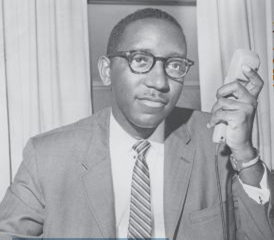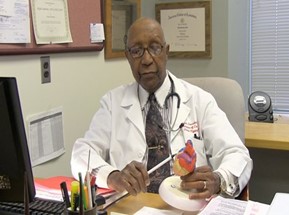Legacy
Dr. Elijah Saunders was born in Baltimore City in 1934. As a young student he received a BS degree from Morgan State College in 1956 and he received his MD degree from the University of Maryland School of Medicine in 1960. During his medical studies, he was one of only four African-Americans in his class of 140 students and was instrumental in helping to desegregate the me dical wards. He then went on to become the first African-American resident in internal medicine at the University of Maryland School of medicine and the first African-American cardiologist in the state of Maryland in 1965.
dical wards. He then went on to become the first African-American resident in internal medicine at the University of Maryland School of medicine and the first African-American cardiologist in the state of Maryland in 1965.
Following fellowship, Dr. Saunders led a successful private practice for the first 20 years of his career before he returned to the University of Maryland as a professor in Cardiology, where he pursued research on hypertension among African Americans. For many years, he led the Hypertension Division in the Department of Medicine. His critical research illuminated that ethnicity may influence the response to certain types of antihypertensive medications. As a result of his research and lobbying, it is now standard for trials to require African Americans to be included in research. Over his career, he published more than 50 peer-reviewed articles and eight books.
Beyond his many achievements, including increasing African American representation in cardiovascular drug trials, being a founding member of the Association of Black Cardiologists, and co-founder of Heart House of the American College of Cardiology; Dr. Saunders was known for his positive demeanor, caring disposition, and gentle spirit. As a young black man growing up in Maryland with an interest in cardiology, Dr. Saunders was someone who I always admired. During my fourth year of medical school I spent an away rotation at the University of Maryland in hopes of training under Dr. Saunders, but was saddened to hear of his untimely passing prior to my arrival. However, I eagerly listened to his patient’s detailed stories regarding his intellect, compassion, dedication to health equity, and desire to bring healthcare to non-traditional spaces to reach the most at-risk populations. This experience quickly reaffirmed that Dr. Saunders was the type of cardiologist I hoped to emulate: clinically skilled, empathetic, and a leader in healthcare innovation.
 Despite improvements in health distribution inequalities, African-American communities are continuously plagued with cardiovascular disease at an alarming rate. Some of the main contributors to the high burden of disease are the persistent and increasing degrees of limited access to healthy food, low socioeconomic status, and poor nutritional awareness. To address this, Dr. Saunders advocated for community screening and outreach in barbershops and churches in order to engage the black community in non-traditional spaces. In 2006, he developed the Hair, Heart and Health program, an innovative program that trained barbers and hairstylists to pre-screen customers for hypertension and then make referrals for medical care.
Despite improvements in health distribution inequalities, African-American communities are continuously plagued with cardiovascular disease at an alarming rate. Some of the main contributors to the high burden of disease are the persistent and increasing degrees of limited access to healthy food, low socioeconomic status, and poor nutritional awareness. To address this, Dr. Saunders advocated for community screening and outreach in barbershops and churches in order to engage the black community in non-traditional spaces. In 2006, he developed the Hair, Heart and Health program, an innovative program that trained barbers and hairstylists to pre-screen customers for hypertension and then make referrals for medical care.
I believe as medical professionals we have two profound responsibilities. The first is to be an effective clinician. It is our obligation to treat and heal patients to the best of our abilities, while cultivating and promoting prevention. The second, and perhaps more important, is to go beyond the hospital walls and become an innovator in healthcare. We must identify roadblocks that may impede healthy practices, and provide sustainable solutions for these challenges. I hope that we can all mimic Dr. Saunders’s spirit for innovation and love of patient care.
“The views, opinions and positions expressed within this blog are those of the author(s) alone and do not represent those of the American Heart Association. The accuracy, completeness and validity of any statements made within this article are not guaranteed. We accept no liability for any errors, omissions or representations. The copyright of this content belongs to the author and any liability with regards to infringement of intellectual property rights remains with them. The Early Career Voice blog is not intended to provide medical advice or treatment. Only your healthcare provider can provide that. The American Heart Association recommends that you consult your healthcare provider regarding your personal health matters. If you think you are having a heart attack, stroke or another emergency, please call 911 immediately.”